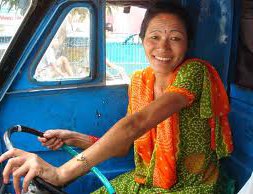
Bimala Gautam, 30, a tempo driver, of Pepsi Cola, starts her duty from early morning at four and works till eight in the evening on RNAC- Pepsi Cola route. As one of the bread earners of her family, Gautam has her say in the family matters.
Until a few years ago, it was strange in the Nepali society to see a woman work outside home till the evening, like Gautam did. However, the perception has changed now. As Gautam makes money and contributes to her household, she has earned her freedom.
''Although I come from a Brahman family, I feel no shame to work as a driver. I’d rather not care about people's backbiting. I believe in hard work. You see, when I started work and made money, I was given a decisive role in the house. I can see violence committed against my colleagues, who do not work, by their husbands. Not me," said Gautam. "Of course, working for such a long time daily is difficult. However, I earn Rs 10,000 a month. With this income, I am supplementing the family's monthly income, offering good food and education to my children."
As she makes money through hard work, Gautam's husband and other family members help her in household chores. "It is not easy for a woman to work inside and outside the home at the same time. My husband makes my work easier by lending his helping hand with some household chores. I respect my work and feel proud to be self-reliant,” said the confident female tempo driver.
Gautam is not the only woman tempo driver feeling such security. Ambika Jimi, 38, a resident of Anamnagar, also drives a tempo on Sundhara-New Baneshwor route. ''When I was jobless, I used to be depending upon the husband's salary and there were no other ways for a strong family support. Now I earn Rs 5,000 per month and I don't depend upon my husband to look after my family. Since I started work, it has not only improved my economic condition, but also built up my confidence level,” said Jimi proudly. "Nowadays I do feel, if both couples are employees, understanding and self-respect for each other will be highly valued.”
Ambika and Bimala are among hundreeds of working women whose situation has drastically changed. Although there are cases of rampant of domestic violence against women in the rural parts of Nepal, many women of Kathmandu city, who are engaged in economic activities, have started enjoying a better life.
Studies conducted by various organizations have shown that economic empowerment of women is a key to reduce domestic violence. Even in rural parts of Nepal, women with better income rarely faced violence. Despite efforts of the government and civil society organizations to reduce violence against women, the scenario has been discouraging. According to Nepal Police, violence against women is on an increasing trend in Nepal. During the last fiscal year, 555 cases of rape and 156 cases of rape attempts were registered by the police.
Nepal Police recorded a total of 3,123 rape cases and 726 attempts in the past 10 years. Similarly, there were 1,116 cases of women trafficking and 10,697 cases of domestic violence against women. Among all the forms of violence against women, domestic violence was the largest in number in the past 10 years. In 2003, there were 569 cases of domestic violence, which rose to 983 and 1, 355 in 2010 and 2011, respectively.
As Nepal has been celebrating 16 days of activism against gender based violence 2013, mixed results are coming in. Every day, the number of women living in rural and even urban regions have gone through one or the other kind of violence. According to Nepal Police records, many cases are being registered by women against violence. The reports show that domestic violence swelled alarmingly by 66.05 percent to a total of 2,250 cases in 2012.
According to United Nations, domestic violence is defined as violence occurring within the private sphere, generally between individuals who are related through intimacy, blood or law. Domestic violence is also referred to as “wife beating", “wife battering" or intimate “partner abuse".
Domestic violence has continued throughout history, unreported and unchallenged. It has profound effects on women. After marriage, the greater risk of violence for women continues to be in their home where husband and family live together. Domestic violence has been taking place primarily within the home and among members of a particular household. Thus, domestic violence has been treated as a private matter and not of social concern and there is a cultural practice not to tolerate interference by any outsider.
''We cannot take a sort of action when males try to take advantage of us. Although woman is becoming independent, but unless society stops to look upon us with disbelief and the sense of ignorance, we never get chances to demonstrate our working skills,” Bimala said.
Violence against women is everywhere in the world. What is lacking in Nepal is that the victims do not bring such cases to light, while the officials do not respond to them seriously and the efforts to empower women are negligible while most of the programs have focused on awareness campaign.
- Menstrual Hygiene
- Jun 09, 2014
- SENIOR CITIZEN: Nowhere To Go
- May 09, 2014
- PRISM: Poverty Reduction
- Apr 19, 2014
- Women's Rights: Continuing Fight
- Mar 09, 2014
- WATER AND SANITATION: Fluid Crisis
- Feb 15, 2014

















